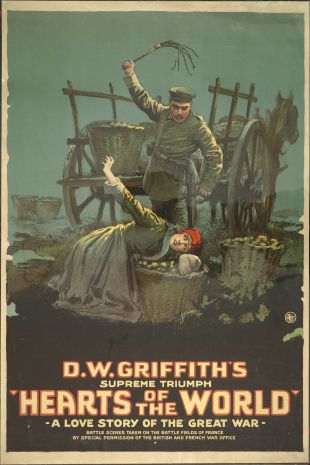
The relatively minor achievement of Hearts of the World, especially compared with its two predecessors, The Birth of a Nation and Intolerance, is not necessarily the fault of filmmaker D.W. Griffith. After all, he was in desperate financial straits when he agreed to make essentially a propaganda film that would encourage the American people to come to the aid of the beleaguered French and British in their desperate fight against the Germans. Seen in its original form, with more extreme versions of the German soldiers (who still manage to come off as lusty and brutal in the 115-minute version reviewed here), the film might have worked better for its original intentions. As it exists now, it's a sentimental love story, though strongly realized by Griffith and played by his two leads, Robert Harron and the always astonishing Lillian Gish. After a conventional back story of The Boy wooing The Girl, the film shifts into high gear with its horrific scenes of violence and privation, Griffith masterfully alternating between the battlefield and the home front. In one pair of sequences, drunken German officers watch scantily clad women twirl in an officer's club while The Boy's three young brothers watch their mother die of overwork and then bury her body beneath dirt floor of their hovel. The film's heart-stopping climax -- will the French retake the village before the Germans kill The Boy and rape The Girl -- sounds impossibly corny on paper, but Griffith and his performers make it work. Achieving a near miracle, Dorothy Gish almost steals the film from her sister with a vivacious portrayal of an effervescent street singer. Relatively minor stuff, to be sure, but only in the context of Griffith's groundbreaking career.
